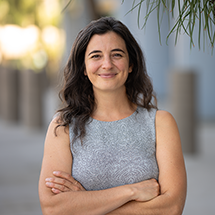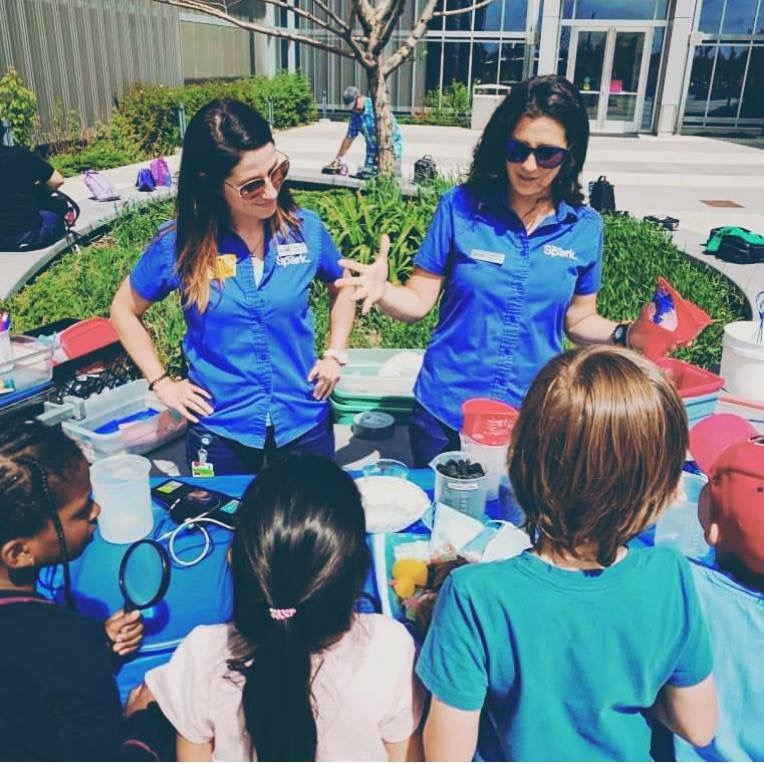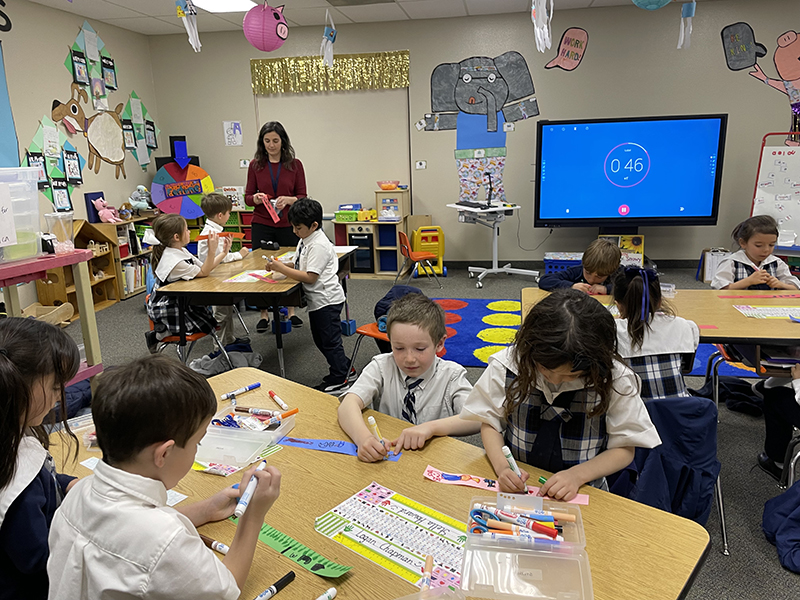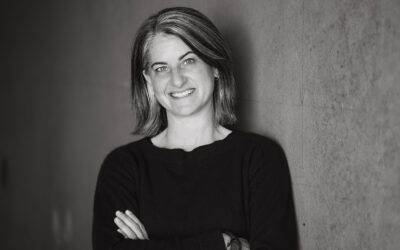
Monica Gehrig joined DRI in summer 2023. She works with the STEM Education Program to bring science education to Nevada schools and builds partnerships with organizations like the Atomic Museum and the Southern Nevada Water Authority. Born and raised in Louisiana, she is now based at DRI’s Las Vegas campus.
In the following interview, Gehrig shares her passion for science education and why she considers it central to understanding the world, her circuitous path to DRI, and her many hobbies outside of work.
DRI: Tell us about your background and what brought you to DRI.
Gehrig: I did an undergraduate degree in English Literature and Creative Writing at Rhodes College in Memphis, Tennessee and went back to my hometown of Shreveport, Louisiana afterward. I had been working with kids since I was 13 years old, and a friend of mine encouraged me to apply for work at the local science museum, Sci-Port Discovery Center. That’s where I fell in love with teaching science, and that really sparked my career.
I come from a family of scientists, my dad is a computer scientist and my mom is an orthopedic surgeon. So, science and exploration were always a part of my childhood. One of my mom’s favorite expressions was ‘let’s do an experiment.’ Whatever we were doing, there was always something to learn, something meaningful to talk about and explore.
On my 25th birthday, I moved to Canada, which had been a dream of mine because I’m a dual citizen and my family is from Saskatchewan. I ended up living there for seven years. I worked as an Educator at TELUS Spark Science Centre in Calgary, Alberta while starting a Master of Arts in Environmental Education and Communication at Royal Roads University in Victoria, British Columbia. I think that grad school saved my career, because up until that point, I felt lost in the doom and gloom of environmentalism. There are just so many huge problems that seem to be unsolvable in our current state of affairs. I loved my job, but it was quite depressing. In grad school, I met Dr. Elen Kelsey, who focuses her research on communicating hope and optimism for environmental stories, and working with her was a really positive experience.

While I was finishing my master’s degree, I moved to Québec City, Québec and enrolled simultaneously in the French Language certificate program at the Université Laval, to really work on my French language skills. I wrapped up both programs at the end of 2019 and moved to Las Vegas to be closer to my parents. When I arrived, I was fortunate to find Green Our Planet. As the Curriculum and Professional Development Manager, I taught STEM, conservation, financial literacy, and health nutrition through outdoor school gardens and hydroponic systems. I’ve always had a passion for growing food. Throughout my early career, I volunteered in youth gardening programs and even worked as the Supervisor of Sunnyside Home and Garden Centre in Calgary. I loved this work, but they moved to predominately online education during and after the pandemic, so I moved to The Meadows School, where I built out their STEAM programs, before coming to DRI in July 2023.

DRI: Did you always want to work in education?
Gehrig: I have been working with kids since I was 13 years old. Initially, I did not consider education as a career route because I wanted to study botany and work in the horticulture field. However, once I took my first job out of college at Sci-Port, I fell in love with science education. Helping students explore phenomenon, ask questions, discover their interests — it all came so naturally to me. It was what I was meant to do. So I followed the call.
DRI: What is your role on the STEM Education team, and what does your day to day look like?
Gehrig: I’m the STEM Education Training and Outreach Administrator, and I predominantly manage and facilitate our professional development trainings, unique programs, and outreach initiatives. We host educator professional development trainings in Las Vegas and Reno, including our Green Box and STEM Co-Lab trainings. I set up the trainings, manage the content, get the word out, create the presentations, all of the behind the scenes admin work. I also recruit presenters and facilitate sessions: recently, we did a training on art and science with microscopes and DRI scientist Tsvetelina Stefanova presented about her work in DRI’s Conservation Ecology Lab. A Clark County School District educator, Jake Johnson, also presented on curriculum integration. Our next training will be held in partnership with the Discovery Children’s Museum, teaching about 3D printers.
For outreach, we participate in a variety of unique programs. For example, this past summer, we worked with UNLV Early Outreach and PACT Coalition to offer a program called “Back to School, Full STEAM Ahead.” We had day camps for elementary school, middle school, and high school students that offered a session for each letter of the STEAM acronym. One session was science, one was technology, then engineering, and so forth.
Another unique program I work on is the EnergySmart Education Program, sponsored by NV Energy and Southwest Gas, This includes our K-12th Grade Green Boxes, 2nd-3rd Grade Theatre Program, 4th Grade Home Kits, Middle School Video PSA Contest, High School Community Energy Ambassador Project, Solar Days summer programming, and community outreach. My role in these programs includes reaching out to new partners, managing the partnerships, and creating and facilitating the programming.
And of course, I’m involved in grant writing to support our work at DRI. We were just awarded an EPA grant for a million dollars to partner with the Truckee Meadows Water Authority and the Southern Nevada Water Authority to develop curriculum and educator professional development trainings that will improve the water workforce pipeline in Nevada, and a DOE grant for 2 million dollars to partner with the Community Environmental Monitoring Program, Cultural Resource Management Program, and Atomic Museum to develop field trips, curriculum, and educator professional development trainings to prepare the next generation with the knowledge and technical skills needed for employment in fields such as clean energy, waste management, and environmental remediation.
DRI: Why do you think STEM Education is important for today’s youth?
Gehrig: I think it’s important because science is all around us. To understand the world, you have to understand science. I also like to bring in art and develop and facilitate STEAM education programs. For example, when young learners are mixing colors, learning the color wheel, a simple, hands-on lesson like that allows you to pull in scientific concepts. I’m a proponent for everyone understanding the systems around us. That also applies to living in today’s world with so much technology. I enjoy helping people understand technology in order to utilize and manipulate it for their own unique purposes. So, I really look at STEAM education as preparing youth with everyday skills that they can use to succeed in the world and cultivate their own success.
STEM fields are also growing exponentially in terms of available careers. So much of STEM is critical thinking and problem solving. They say we don’t know what the jobs are going to be in the future because our world is changing so rapidly. Which is why project-based learning in STEM is so important. They’re learning how to critically think, they’re learning how to problem solve. I want to help prepare students for success by teaching those skills so they can utilize them in any situation.
DRI: What are some key ways to engage students in these topics?
Gehrig: I’m a big supporter of experiential learning. I find it’s helpful to start with a baseline of the foundational content or information that is going to be covered, and then jump in and try it out. See how it works with hands-on experimentation. Once the experiment is over, come together and discuss findings, observations, and take time to answer any questions. This format allows students space to engage with the material in a meaningful way. I think giving any student, whether it’s an educator in a professional development training or a fifth grader in one of our programs, the ability to really do it themselves is very important.
DRI: What are you most excited about achieving in this role?
Gehrig: I want to provide accessible, engaging, and fun STEM professional development trainings for educators so that they go back to their classroom confident in teaching the STEM topics. Many educators aren’t confident in teaching STEM content and are given tools such as 3D printers or hydroponics systems without the proper training on how to operate the equipment. So, I really love working with educators and offering opportunities for them to learn more about scientific concepts while also gaining hands-on experience with the lesson activities and teaching tools. I want them to think ‘Okay, I have this tool, and I’m confident that I can facilitate this in the class and use it to spark student interest.’
I also want students to feel the joy and curiosity that I felt as a kid when I was experimenting and discovering the world around me. I would like to develop and facilitate programming that helps students discover their interests and develop critical life skills.
DRI: What do you like to do when you’re not working?
Gehrig: When I’m not working, I really like to go for bike rides. I like to garden, both outdoors and hydroponically. I love to cook. I love languages and other cultures. I love to travel. I love to read, do yoga. I sew and knit. I love board games. I love playing soccer — I played soccer competitively for 14 years of my life. I love to hike and go on camping trips. And I’m learning to play guitar.
DRI: Is there anything else that you want the DRI community to know about you?
Gehrig: I really love DRI. I love working here. I’ve officially been here for over a year now, and I am just so appreciative of everyone here. I’ve learned a lot in the last year, and there have been a lot of people who have helped me along. I think it’s a really special place to work.
Also, we’re going to continue to grow hydroponically on both campuses, and we’ll have our harvests starting again this fall. Everyone is welcome to come and harvest and enjoy the food with us!
If anyone wants to start a soccer team in Las Vegas, let me know!
DRI: If you could recommend one book to your colleagues, what would it be?
Gehrig: Robin Wall Kimmerer’s Braiding Sweetgrass. I think she does a really beautiful job of bringing the scientific world and Indigenous Knowledge together. I am Métis, which is an Indigenous group whose historic homelands include the three prairie provinces in Canada. Supporting Indigenous people and ways of knowing is something that informs my work.


